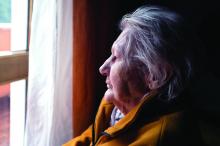Older people are much more likely than younger people to experience a poorer clinical course of major depression, even after accounting for differences in social, clinical, and other health factors, new research suggests.
A longitudinal cohort study, published in the Lancet Psychiatry, examined baseline and 2-year follow-up data from 1,042 participants who had a recent diagnosis of a depressive or anxiety disorder in two previous cohort studies.
More than half (51%) of people aged 70 years or older still had a depression diagnosis 2 years after the initial diagnosis, compared with 36% of people aged 18-29 years. Those over age 70 years also showed less of a decline in depression severity, compared with those aged 18-29 years, and the time to remission was longest for older individuals.The authors adjusted initially for the number of major depressive disorder (MDD) episodes, comorbid anxiety, and antidepressant use but still found that older age was significantly associated with increased risk of a depressive diagnosis, a chronic symptom course, reduced likelihood of achieving remission, and a smaller decrease in depression severity.
They also adjusted for other factors common in old age, such as loneliness, social support, pain, other chronic disease, and higher body mass index, and again found that this only led to small reductions in the association with older age. However, the adjustment for loneliness did have the effect of dissipating the association between older age and the presence of any depression diagnosis.
“ and that are thought to worsen the course of the disease,” wrote Roxanne Schaakxs, PhD, of the Amsterdam Public Health Research Institute at VU University Medical Center, and her coauthors.
Researchers also looked for an effect of antidepressant use, in case the age differences might be related to differences in treatment response. “However, adjustment for antidepressant use at baseline did not substantially change our findings, and stratified analysis for participants who did and did not use antidepressants revealed consistent age–MDD course associations for both subsamples,” they wrote.


